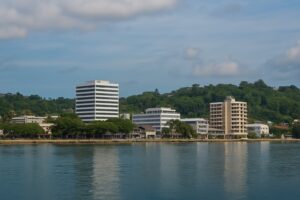Vanuatu’s Bold Blueprint: Pioneering Solutions for Climate Loss and Damage in the Face of Adversity
This article explores how Vanuatu, despite its minimal contribution to global greenhouse emissions, is taking significant strides to combat climate loss and damage through innovative strategies and international advocacy. As a nation highly vulnerable to climate-related risks, Vanuatu’s proactive approach includes integrating these challenges into its Nationally Determined Contributions (NDCs), implementing a robust National Climate Change Adaptation Strategy, and pushing for global financial mechanisms to support affected communities. This comprehensive review will detail these efforts and their implications for both national and global climate resilience.
Vanuatu’s Climate Vulnerability
Vanuatu’s exposure to climate-related risks such as tropical cyclones, sea-level rise, and extreme weather events is profound, despite its negligible 0.0016% contribution to global greenhouse gas emissions. The urgency of these challenges was highlighted when Vanuatu declared a Climate Emergency in May 2022, reinforcing its dedication to tackling these issues comprehensively.
Nationally Determined Contributions (NDCs)
Vanuatu’s updated NDC, submitted ahead of COP27, is among the most ambitious globally. It uniquely includes sections on Loss and Damage as well as Adaptation, emphasizing the importance of treating Loss and Damage as a central component of the Paris Agreement. The NDC aims for a 100% renewable energy target in electricity generation by 2030, phasing out reliance on fossil fuels, and serves as a call to action for other nations to incorporate Loss and Damage into their climate policies.
Incorporating Loss and Damage into NDCs
Vanuatu’s NDC is pioneering in its detailed costing and breakdown of loss and damage interventions, providing a transparent overview of how funds are needed and will be used domestically. This methodology shifts the focus from contentious debates over compensation to a more collaborative approach focused on shared global responsibility for climate impacts.
Financial Needs and Gaps
Addressing loss and damage in Vanuatu requires significant financial resources, with an estimated need of approximately USD 720 million. This stark figure underscores a global financial gap, with developing nations needing between USD 290 billion and USD 580 billion annually by 2030 to effectively manage climate impacts.
National Climate Change Adaptation Strategy (NCCAS)
Vanuatu’s National Climate Change Adaptation Strategy (NCCAS) for 2012-2022 lays out a strategic framework to manage the impacts of climate change on its land-based sectors. Through detailed action plans and sector-specific strategies, this policy involves various stakeholders, including civil society, in building resilience against climate change.
Sector-Specific Adaptation
The NCCAS provides tailored adaptation strategies for critical sectors like agriculture, water resources, and biodiversity conservation. These strategies aim to minimize vulnerabilities and enhance preparedness for adverse climate impacts, ensuring a coordinated response across all levels of society.
International Leadership and Advocacy
On the international stage, Vanuatu champions significant initiatives, such as advocating for the establishment of a Loss and Damage Finance Facility under the UNFCCC and pushing for an Advisory Opinion from the International Court of Justice on climate obligations. These efforts aim to secure more effective global responses and inspire greater climate action worldwide.
Data: Key Insights on Vanuatu’s Climate Actions
- Climate Vulnerability: Vanuatu faces significant risks despite minimal emissions.
- Ambitious NDCs: Targets 100% renewable energy by 2030 with comprehensive Loss and Damage integration.
- Financial Needs: Requires an estimated USD 720 million for addressing domestic loss and damage.
- NCCAS: A detailed adaptation strategy involving diverse societal sectors.
- International Advocacy: Pushes for global financial mechanisms and legal clarity on climate responsibilities.
In conclusion, Vanuatu’s strategic and proactive measures in addressing climate loss and damage offer a model of resilience and leadership. By integrating comprehensive strategies into national policies and advocating for global cooperation, Vanuatu not only addresses its vulnerabilities but also contributes significantly to the global dialogue on climate change mitigation and adaptation. This serves as an inspiring example for nations worldwide, highlighting the importance of solidarity and proactive action in the face of the global climate crisis.










